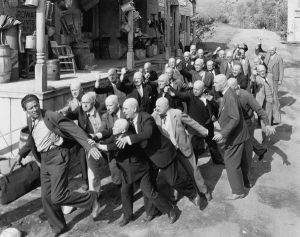
Hospital administrators throughout Texas say the insurance company is using “strong-arm” tactics to push unfavorable contracts……………
Struggling Rural Hospitals Say They’re Being Preyed Upon by Blue Cross Blue Shield
Wed, Dec 5, 2018 at 12:41 pm CST
It’s hard to keep a hospital running in Iraan, a dusty community of 1,229 people in the middle of the West Texas oil patch. In the 2017 fiscal year, Iraan General Hospital lost $1.1 million; in 2018, it lost $1.2 million, the result of small patient loads, the state’s refusal to expand Medicaid and years of financial mismanagement.
With mounting losses, the hospital’s board recently brought on Keith Butler, a hospital administrator with 38 years of experience, to stop the bleeding. The new interim CEO had just started this spring when he was faced with an unexpected crisis: Blue Cross Blue Shield of Texas, the gargantuan health insurance company that claims one-quarter of the marketplace in the state, sent Butler a letter asking to renegotiate its contract with the hospital. Attached was a new contract. All Butler had to do was sign.
“I pulled it up and started looking at the contract,” Butler told the Observer. “It was terrible. It would have hurt this hospital a lot.” The document proposed slashing the reimbursements that Blue Cross, the hospital’s biggest source of revenue, would pay for patient services such as outpatient clinic visits and emergency room care.
As much as 80 percent of charges at rural hospitals are reimbursed through private payers like Blue Cross Blue Shield, compared to the 20 or 30 percent that Medicaid covers. In Iraan, the local school district — one of the biggest employers in the area — and the hospital itself insures its employees through Blue Cross.
Butler sent the company a counteroffer. Then, he said, Blue Cross ghosted him for almost three months before resorting to what he calls “strongarm” tactics: The company sent letters to its customers, including hospital employees, stating that a hangup in contract negotiations with the hospital could lead to the facility being considered “out of network” for Blue Cross policyholders, he said. Put simply, patients covered by Blue Cross would have to travel dozens of miles to another hospital if they expected the insurance company to pick up the bill.
“It outraged the community. And guess who they were mad at? Me,” Butler said. He alleges the move was a play to drum up patient discontent that would pressure the hospital to quickly accept a deal.  “They would have taken me out of town on the rails had I dropped out of the network. But had I signed that original contract, the hospital would have been damaged to the point of failure,” Butler said.
“They would have taken me out of town on the rails had I dropped out of the network. But had I signed that original contract, the hospital would have been damaged to the point of failure,” Butler said.
Butler eventually negotiated a slightly better deal than the initial offer, but it’s still financially detrimental to Iraan General. He estimates that the hospital will lose “hundreds of thousands” on payments on laboratory tests, a significant portion of the services the hospital provides. He said the facility runs an average of 50 lab tests a day — mostly blood screenings — and that the new deal “will take a significant hit on our bottom line.” Reimbursements from other hospital services may be able to temper some of those losses, but there’s no way to know for sure, Butler said.
Iraan General isn’t the only small-town hospital to feel Blue Cross Blue Shield’s screw-turning, said John Henderson, CEO of the Texas Organization of Community and Rural Hospitals. At several rural facilities across the state, the insurance giant is proposing lowball reimbursement rates and sending letters to customers to turn up the heat on unwilling hospital administrators, he said. “It puts those hospital leaders in a terrible predicament because it’s a public relations nightmare for them,” Henderson said, adding that the company’s actions are “unusual” for any private insurer.
In a statement emailed on Monday, a spokesperson for Blue Cross Blue Shield of Texas said that it has pushed renegotiations with “a group of” rural hospitals because they held outdated contracts that “needed to be updated to include new protections for members and employers.” The spokesperson said the company “continues to negotiate in good faith with a group of rural hospitals across the state” and pointed to a $10 million initiative it funded last month at Texas A&M University to explore new health care delivery options in rural areas.
 “They would have taken me out of town on the rails had I dropped out of the network. But had I signed that original contract, the hospital would have been damaged to the point of failure.”
“They would have taken me out of town on the rails had I dropped out of the network. But had I signed that original contract, the hospital would have been damaged to the point of failure.”
Rural, independent hospitals are woefully ill-equipped to wage a contract war with Blue Cross. Many of them have little experience negotiating reimbursement contracts and lack leverage over a huge insurer that can afford to take the facility out of network. “It’s all budget dust for a company like Blue Cross,” Henderson said. To top it all off, antitrust rules prohibit rural hospitals from collectively bargaining with the company to get better rates, leading to a scenario where the administrators are “doing 100 separate contracts renegotiations on an island,” Henderson said.
At the moment, rural hospitals are in a bad way. Since 2013, at least 18 of the state’s roughly 150 rural hospitals have closed, casualties of low patient volumes, stingy Medicaid and Medicare reimbursement rates, and the burden of operating in a state with the most uninsured people. At least 75 more hospitals are at risk of closure, according a recent report. Some have drastically cut services. For example, Stamford Memorial Hospital in Stamford, about 40 miles north of Abilene, closed in July and reopened as an outpatient clinic, leaving nearby residents without crucial emergency care. Others, such as two hospitals in Milam County near Austin, are slated for closure altogether.
Meanwhile, Health Care Service Corp., the parent company of Blue Cross, posted $1.3 billion in profits last year.
Since 2013, at least 18 of the state’s roughly 150 rural hospitals have closed. Jen Reel
“They’re putting up monster profits,” said Adam Willmann, CEO of the Bosque County Hospital District, which finalized reimbursement negotiations with Blue Cross in October. The hospital district based in Clifton, a small Central Texas town, has faced similar financial struggles. The operation broke even in 2016 but posted a $1.2 million loss in 2017 and lost another $705,000 this year. In November, voters in Bosque County narrowly approved the creation of a hospital district that can levy taxes to support the county hospital. “I’m scraping to pay [employees]. But after all expenses, Blue Cross Blue Shield posted a great [year]. And that’s who we’re trying to negotiate with,” Willmann said.
Willmann said the current contract with Blue Cross will have to be renegotiated in a year. Once again, he’ll be at the company’s mercy.
“What are you gonna do? Terminate your agreement?” he said. “It’s like going to a poker game where everybody gets five cards but you’ve got to try to make a flush out of two.”

